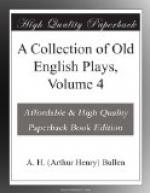More hayre than wit
Morglay
Mosch
Mother
Motion ( = suggestion, proposal)
Mouse
Much (ironical)
Mumchance
Muscadine
Muschatoes ( = moustaches)
Mushrumps ( = mushrooms)
Music played between the acts
Muskadine with an egg
My Love can sing no other song (See Appendix)
Mynsatives
Nephewes
Nero, his poems
Newmarket
Nifle
Night rail
Ninivie, motion of
Noddy
Old
Orphant
Outcryes
Outface with a card of ten
Overseene
Owe
Pantables ( = slippers)
Paris Garden ditch
Pavine
Pedlars’ French
Peele’s Hunting of Cupid
Peeterman
Persius quoted
Pharo, by the life of (This oath occurs in first
edition, 1601, of
Every Man in his Humour: in
the revised edition it was altered to
“by the foot of Pharaoh.”)
Picardo
Pick-hatch
Pilchers
Pimblico
Pinks
Pioner
Plancher
Planet ("Some Planet striketh him”)
Plashd
Platform
Plautus’ Rudens, plot of Heywood’s
play The Captives drawn from:
quotations from
Pomander
Poore Jhon
Poore Man’s Comfort (play by Robert Daborne),
MS. copy of
Portage (Undoubtedly we should read partage.)
Pot-gun
Pricke-song
Prick and prayse ( = praise of excellence)
Princkocke
Proclamation that the gentry should reside at their
mansions in the
country
Proculus
Prologue spoken by a woman
Protest, affected use of the word (See Dyce’s
Shakespeare Glossary.)
Puckfist
Puerelis
Puisne
Puisnes of the Inne
Pumpion
Pun[to] reversos ( = back-handed strokes in fencing)
Push
Putt a girdle round about the world
Puttock
Quale
Rabbit-suckers
Rabby Roses (The reference is, probably, to the Arabian
physician
Rhazes.)
Racke
Rape, punishment for
Rascal
Rats rhymed to death
Refuse me
Regalias
Rest ("our rest we set”)
Rest for every slave to pull at
Reverent ( = reverend)
Richard II., MS. play
Ride the wild mare (a rustic sport)
Rincht ( = rinsed)
Road
Roaring boys ( = roisterers)
Rochet
Rope-ripes
Rosemary
Rotten hares
Rudelesse vaile
Russeting
Sackerson (In the footnote read H_u_nkes for H_a_nkes.)
Salt, sit beneath the
Sarreverence
Scandalum magnatum
Sconce, build a (I supposed that the expression meant
“fix a candle in a
candlestick,” but I am indebted
to Mr. George L. Apperson for the true
explanation. He writes:—“In
Dyche’s Dictionary (I quote from ed.
1748) is the verb sconce, one of
the definitions being—’a cant term
for running up a score at an alehouse
or tavern’—with which cf.
Goldsmith’s Essays (1765), viii,
’He ran into debt with everybody that
would trust him, and none could build




